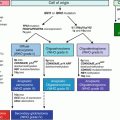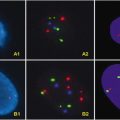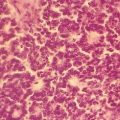179.
Quax PH, de Bart AC, Schalken JA, Verheijen JH (1997) Plasminogen activator and matrix metalloproteinase production and extracellular matrix degradation by rat prostate cancer cells in vitro: correlation with metastatic behavior in vivo. Prostate 32(3):196–204PubMed
180.
Rabbani SA (1998) Metalloproteases and urokinase in angiogenesis and tumor progression. In Vivo 12:135–142PubMed
181.
Festuccia C, Giunciuglio D, Guerra F, Villanova I, Angelucci A, Manduca P, Teti A, Albini A, Bologna M (1999) Osteoblasts modulate secretion of urokinasetype plasminogen activator (uPA) and matrix metalloproteinase-9 (MMP-9) in human prostate cancer cells promoting migration and matrigel invasion. Oncol Res 11:17–31PubMed
182.
Skogseth H, Larsson E, Halgunset J (2005) Inhibitors of tyrosine kinase inhibit the production of urokinase plasminogen activator in human prostatic cancer cells. APMIS 113:332–339PubMed
183.
Skogseth H, Larsson E, Halgunset J (2006) The invasive behaviour of prostatic cancer cells is suppressed by inhibitors of tyrosinekinase. APMIS 114:61–66PubMed
184.
Skogseth H, Larsson E, Halgunset J (2006) Urokinase plasminogen activator receptor (uPAR) expression is reduced by tyrosinekinase inhibitors. APMIS 114:307–313PubMed
185.
Skogseth H, Larsson E, Halgunset J (2006) Transcription levels of invasion-related genes in prostate cancer cells are modified by inhibitors of tyrosine kinase. APMIS 114:364–371PubMed
186.
Li Y, Rizvi SM, Ranson M, Allen BJ (2002) 213Bi-PAI2 conjugate selectively induces apoptosis in PC3 metastatic prostate cancer cell line and shows anti-cancer activity in a xenograft animal model. Br J Cancer 86:1197–1203PubMed
187.
Li Y, Abbas Rizvi SM, Blair nee Brown JM, Cozzi PJ, Qu CF, Ow KT, Tam PN, Perkins AC, Russell PJ, Allen BJ (2004) Antigenic expression of human metastatic prostate cancer cell lines for in vitro multiple-targeted alpha-therapy with 213Bi-conjugates. Int J Radiat Oncol Biol Phys 60:896–908PubMed
188.
Wang J, Abbas Rizvi SM, Madigan MC, Cozzi PJ, Power CA, Qu CF, Morgenstern A, Apostolidis C, Russell PJ, Allen BJ, Li Y (2006) Control of prostate cancer spheroid growth using 213Bi-labeled multiple targeted alpha radioimmunoconjugates. Prostate 66:1753–1767PubMed
189.
Pulukuri SM, Gondi CS, Lakka SS, Jutla A, Estes N, Gujrati M, Rao J (2005) RNA interference-directed knockdown of urokinase plasminogen activator and urokinase plasminogen activator receptor inhibits prostate cancer cell invasion, survival, and tumorigenicity in vivo. J Biol Chem 280:36529–36540PubMed
190.
Josephy PD (2010) Genetic variations in human glutathione transferase enzymes: significance for pharmacology and toxicology. Hum Genomics Proteomics 2010:876940PubMed
191.
Armstrong RN (1997) Structure, catalytic mechanism, and evolution of the glutathione transferases. Chem Res Toxicol 10:2–18PubMed
192.
Villafania A, Anwar K, Amar S, Chie L, Way D, Chung DL, Adler V, Ronai Z, Brandt-Rauf PW, Yamaizumii Z, Kung HF, Pincus MR (2000) Glutathione-S-Transferase as a selective inhibitor of oncogenic ras-p21-induced mitogenic signaling through blockade of activation of jun by jun-N-terminal kinase. Ann Clin Lab Sci 30:57–64PubMed
193.
Zöchbauer-Müller S, Fong KM, Virmani AK, Geradts J, Gazdar AF, Minna JD (2001) Aberrant promoter methylation of multiple genes in non-small cell lung cancers. Cancer Res 61:249–255PubMed
194.
He Y, Zhou GQ, Li X, Dong XJ, Chai XQ, Yao KT (2009) Correlation of polymorphism of the coding region of glutathione S-transferase M1 to susceptibility of nasopharyngeal carcinoma in South China population. Ai Zheng 28:5–7PubMed
195.
Stephen JK, Chen KM, Raitanen M, Grénman S, Worsham MJ (2009) DNA hypermethylation profiles in squamous cell carcinoma of the vulva. Int J Gynecol Pathol 28:63–75PubMed
196.
Lee WH, Isaacs WB, Bova GS, Nelson WG (1997) CG island methylation changes near the GSTP1 gene in prostatic carcinoma cells detected using the polymerase chain reaction: a new prostate cancer biomarker. Cancer Epidemiol Biomarkers Prev 6:443–450PubMed
197.
Goessl C, Müller M, Miller K (2000) Methylation-specific PCR (MSP) for detection of tumour DNA in the blood plasma and serum of patients with prostate cancer. Prostate Cancer Prostatic Dis 3:S17PubMed
198.
Herman JG, Graff JR, Myöhänen S, Nelkin BD, Baylin SB (1996) Methylation-specific PCR: a novel PCR assay for methylation status of CpG islands. Proc Natl Acad Sci U S A 93:9821–9826PubMed
Stay updated, free articles. Join our Telegram channel

Full access? Get Clinical Tree






